We put two A2-compliant bikes up to the test, read and let us know your own verdict in the comments…
Honda CL500 v Royal Enfield Meteor
Just got your A2 licence with the ink still wet on it, and eager to get your hands on a great bike you can hop on and ride right this minute?
Well, walk this way, with two fabulous choices: one which is yet another brilliant 500cc machine from Honda, and the other which combines retro beauty with modern engineering, handling and reliability.
Honda CL500
Honda and 500s go together like Ant and Dec and chips with mayonnaise, that fabulous Dutch invention.
If you really want to annoy a Dutchman, tell him the Belgians thought of it first.
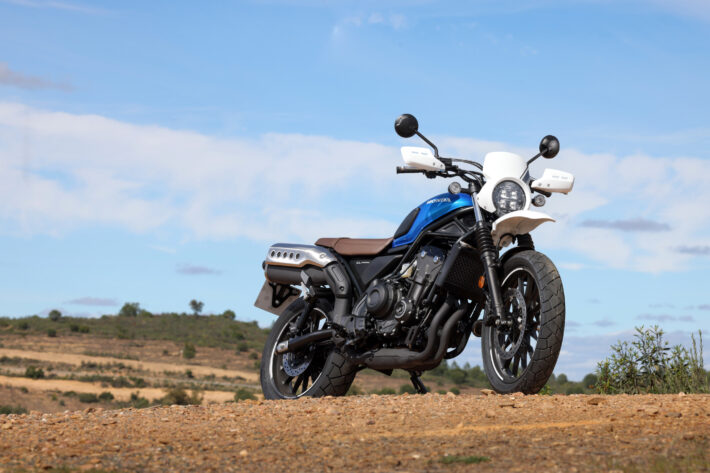
Whether it’s the naked CB500F, the adventure CB500X, the sporty CBR500R or the CMX500 Rebel cruiser, they all have one thing in common – they’re a perfect instruction to motorcycling for newbies with the ink still wet on their A2 licence, but spirited enough to be fun for more experienced riders.
It’s a formula that works – Honda’s sold 133,000 of them since 2013, and while adrenalin junkies may mock 500c machines as dull, especially from a company such as Honda known for safe, predictable machines, the truth is that they’re great little bikes.
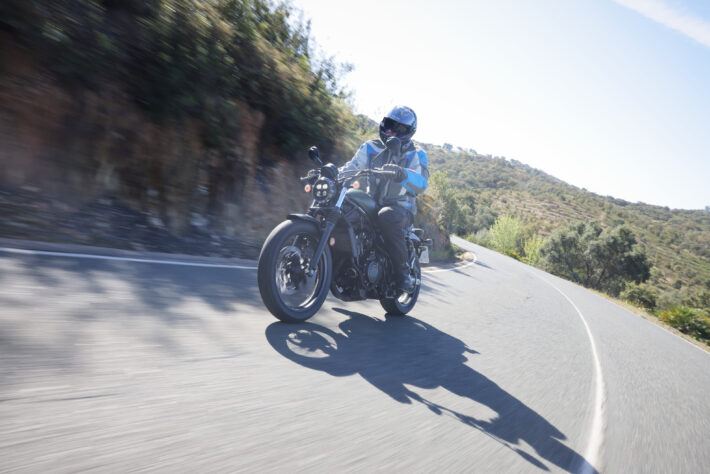
And now to that pantheon of dinky delights, you can add the CL500, a scrambler-style naked with light off-road aspirations.
Which suited me fine, since the week before on the launch of the Multistrada V4 Rally, a 275kg beast with heavy off-road aspirations, I’d fallen off, thankfully on nice soft Sardinian sand.
On the road, the Rally and other high-tech machines handle well because of a million gizmos such as cornering ABS and traction control, but the Honda doesn’t need any of those because it’s simply perfect by design.
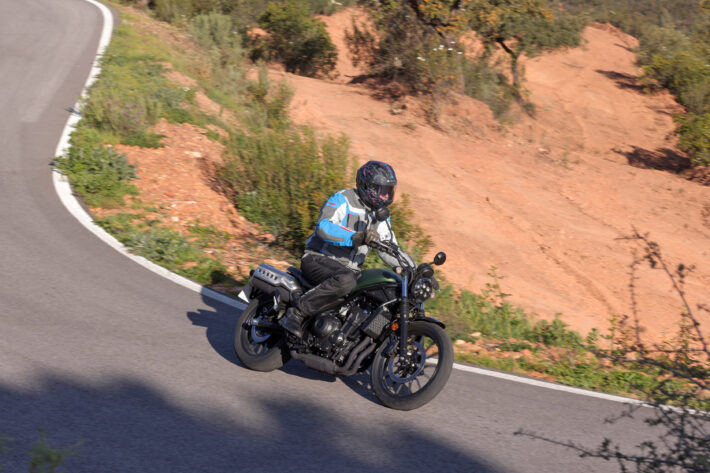
It’s very telling that the design team all look about 12, and even the oldest is only 36, but that hasn’t stopped them adopting the ancient Japanese obsession with detail in the search for that perfection. They tried 20 different types of rubber for the footpegs, for example, before choosing which gave the best feel.
The first CL in 1962 was a 250, then 350 in 1968 and 450 in 1970, and the design of this latest 500 variant harks back a bit to the 1970s, with its flattish seat and high scrambler-style exhaust.
Climb aboard, and you feel instantly at home, with decent mirrors and a simple circular dash, the only minor complaint being that it proved difficult to read in sunlight, even after adjusting it to maximum brightness.
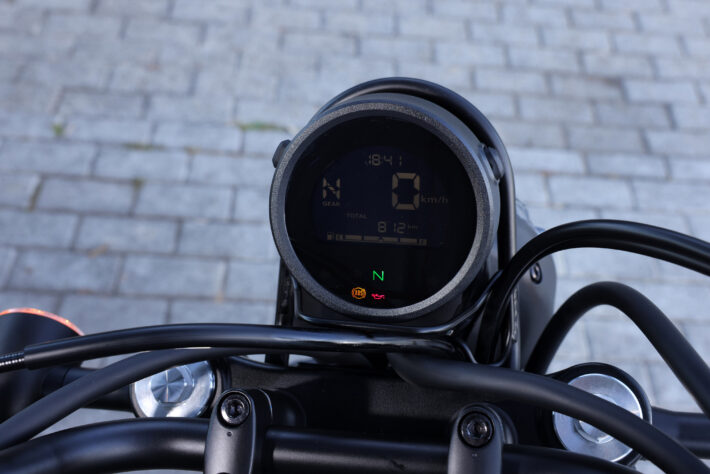
There’s also no rev counter, although the engine lets you know it’s time to change up by transmitting a strange tingling sensation to your nether regions when you’re thrashing it too much.
Mind you, some people pay good money for that sort of thing. The tingling, that is, not the thrashing.
There’s only one disc up front, but since the bike only weighs 192kg wet, it’s more than enough, and there’s lovely progressive bite and feel from both front and rear brakes.
With that weight in the middle of the bike and low, the handling’s as light as the shadow of a feather falling on a lake by moonlight, but twist the throttle coming out of a corner, and it can fairly crank on a bit, with a surprisingly meaty snarl from the exhaust like a kitten wanting to prove it’s actually a tiger.
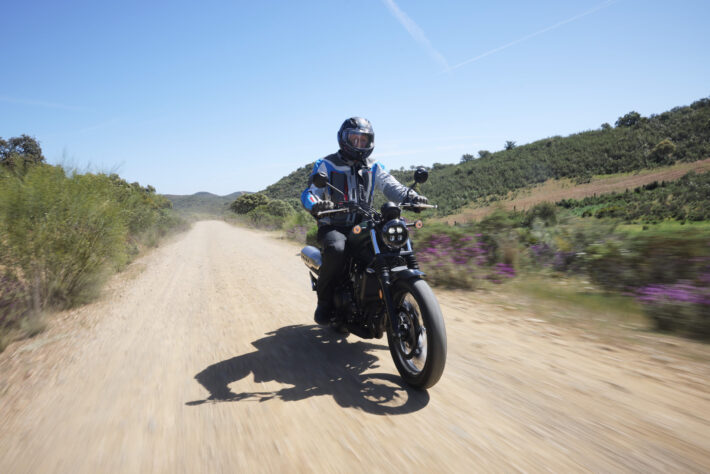
For heavier riders, firming up the rear suspension preload sharpens up the handling even more.
After threading seamlessly through the Seville traffic and escaping to the sun-kissed hills beyond, what a simple, glorious joy it was to fling it around bend after bend without a care in the world, while a brief foray off-road ticked its scrambler credentials.
Not only is it the cheapest of Honda’s 500 family, this little gem is motorcycling in its purest form – a fabulous combination of being incredibly easy yet fun to ride.
In short, it’s a winner as much as chips with mayo. Ask any Dutchman.
Royal Enfield Meteor 350
As I’ve said before to anyone who bothers to listen, mostly the cat, every motorcycle comes with its own fantasy.
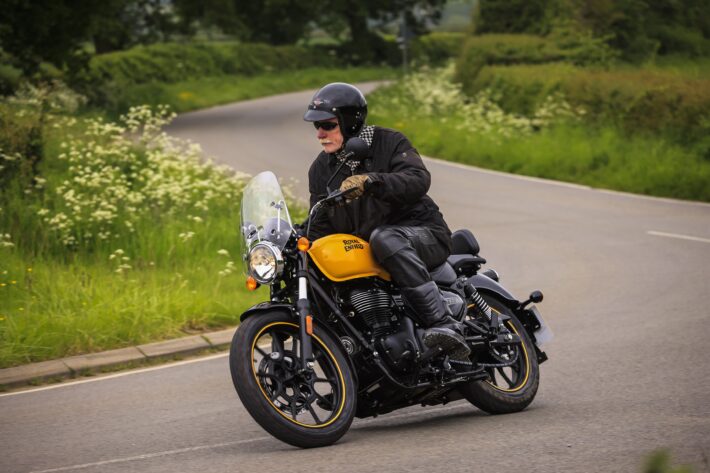
On a Harley, you’re riding west on Route 66 for a burger and beer with your tough but tender cowgirl sweetheart, on a Norton you’re Geoff Duke roaring to victory in the 1950 TT, and on a Royal Enfield, you’re pottering through the Cotswolds on your way home from the airfield for afternoon tea with your fiancée Cynthia, a fragrant English rose who rescues puppies.
And indeed there I was, humming along happily through the Cotswolds on the new Meteor 350, the latest in a long line of Royal Enfield cruisers dating back to the original Meteor 350 of 1952.
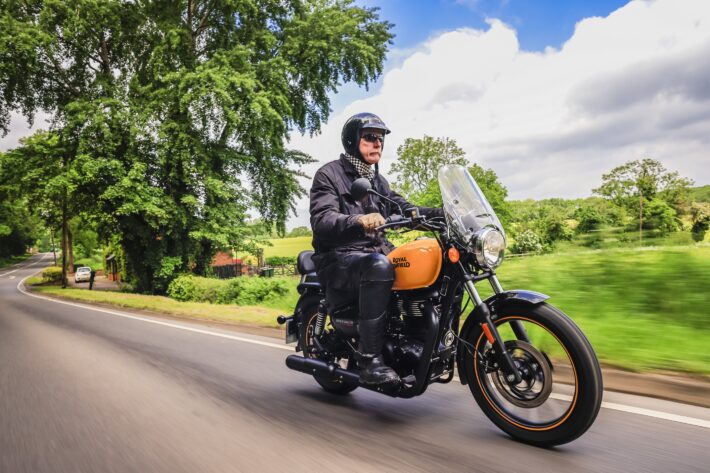
The latest iteration is new from the ground up, but thankfully it’s retained the cushioned thump which for me will always be the heartbeat of India since Paddy Minne and I rode two Bullet 500s from Delhi back to the UK in 1998.
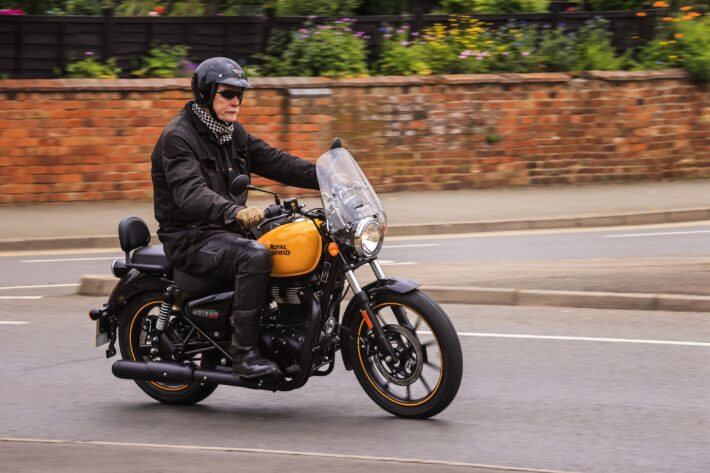
They were made of tinfoil and hope, and every bit which could rattle and fall off did, but with Enfield now producing over 900,000 bikes a year in three state-of-the-art factories in India, backed up by two even more state-of-the-art tech centres there and in the UK, this one’s beautiful old school looks hide a host of modern refinements.
The low seat and 191kg wet weight are designed for easy handling, and the highish bars and slightly forward pegs for relaxed all-day pottering.
Not too far forward, mind you. Ducati take note, since it ruined the Diavel with the forward pegs on the XDiavel, and Harley, whose so-called highway pegs assume that the human body is U-shaped and that we all have a physio on speed dial.
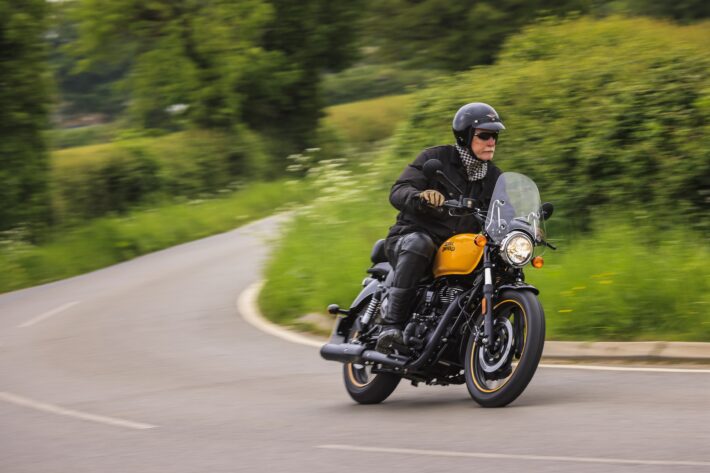
The speedo is an elegant blend of digital and analogue, with all the info you need: speed, fuel, gear, time and trip, and beside it is a neat little screen which links to Google Maps and gives you simple navigation – a bit like what Triumph’s done with the Beeline, although in that case it’s a £199 strap-on extra.
There are lovely details everywhere, like the retro-style switches and the beautifully designed filler cap.
Start up, and the air fills with that gentle putter which always brings me back to sitting in Delhi in 1998, looking at the chaotic traffic and thinking that I’d only passed my test a couple of years before, only ridden 30 miles in my life, and was just about to ride the 7,000 miles home. Bonkers, and a good thing too. Normality is death.
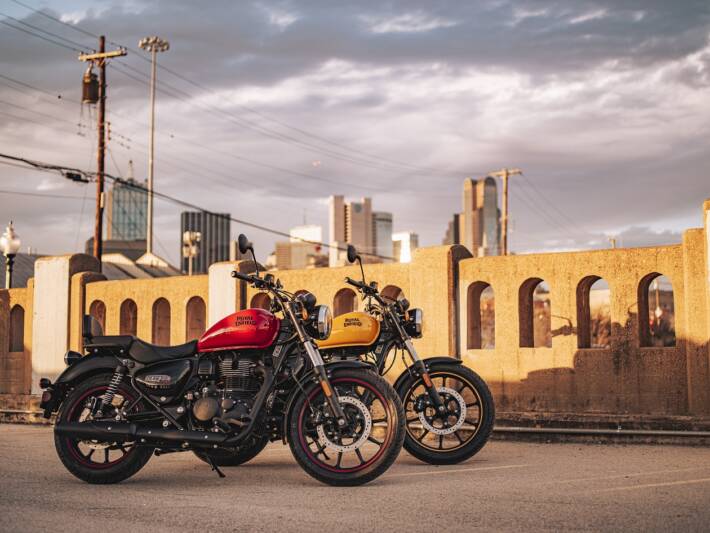
Acceleration is surprisingly brisk from only 20bhp, as below you, the soundtrack from that happy little engine rises to an eager thrum.
Handling, as I expected, is as light as the ghost of a small feather, and although I’m taller and heavier than the average rider, I didn’t feel any need to adjust the rear suspension preload.
Rather cleverly, the bike won’t let you start the engine with the side stand down, normally a feature on more expensive machines, and apart from a couple of false neutrals, the five-speed gearbox is as sweet as a nut.
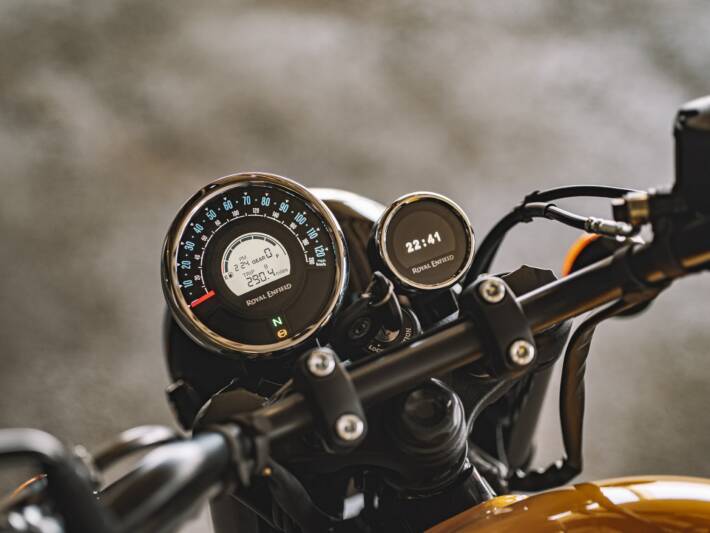
Even with a single disc, the front brake is entirely adequate, backed up by a hefty rear disc because the riders of heavier cruisers tend to use both brakes, and although the Meteor is so light that it’s hardly necessary, I did find myself using both in hard braking to keep the bike nicely stable.
It came in handy when the blind chap in the Range Rover pulled out of the driveway of his charming mansion. Probably that fellow Clarkson.
Top speed is a gnat’s whisker over 70mph, so motorway cruising is entirely possible, although the bike’s at its happiest in environments like the sinuous A and B roads of the Cotswolds we were on at the launch, or filtering with ease through urban traffic.
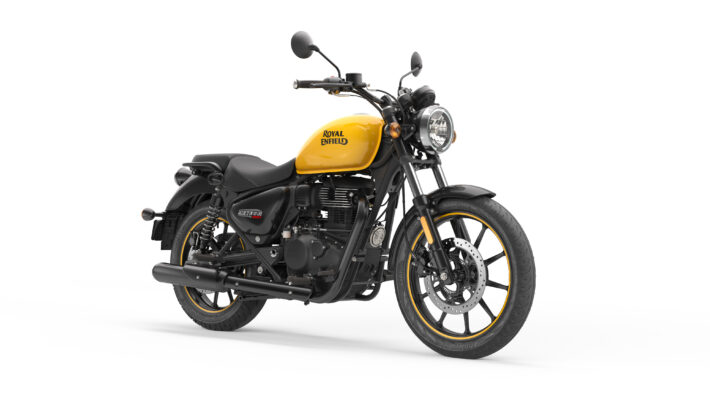
After over two hours of spirited riding, the fuel gauge hadn’t budged, so I estimate the economy at about 100,000mpg.
As Enfield’s Head of International Business Arun Gopal said, in 2018 the lovely little Himalayan adventure bike increased the company’s European sales from 3,361 to 6,330 a year, then in 2019 the brilliant 650 twins doubled that again to 11,666.
Will this bargain beauty do the same again? Well, at a price which makes it the most inexpensive classical motorcycling you’ll find, I wouldn’t be a bit surprised.
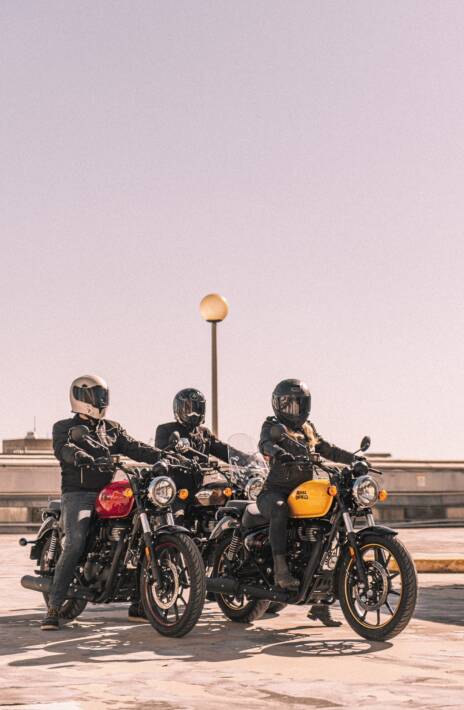
It’ll be the perfect choice for riders moving up from 125cc, retro lovers on a budget, commuters with a sense of style or just anyone who enjoys the simple pleasure of being out on the road on a fine day without needing 200bhp and a gazillion riding aids.
It’s a little gem, as gentle, enthusiastic and giving as, well, a woman who rescues puppies.
Now if you’ll excuse me, I’ll see if I can use this navigation thing to find out where Cynthia’s got to.
I suspect I’ll arrive home to find a Great Dane in the kitchen.
The verdict
The Japanese company’s 500cc machines are perfect for A2 licence holders but fun for more experienced riders, and the CL500 is a little gem: motorcycling in its purest form, and a fabulous combination of being incredibly easy yet hugely satisfying to ride.
The Meteor 350, meanwhile, is a bargain beauty with surprising oomph and featherlight handling, making it the perfect introduction to classic motorcycling.
It’s a tribute to the genius of its designers that a 20bhp bike looks so good and is such an engaging ride, but surely Royal Enfield’s Head of Dosh has made a mistake. Can that price really be right? It is? Where do I sign?
Logically, the Honda is a better bike, with brilliant handling and more than twice the horsepower of the Enfield, but if you’ve a love for all things retro and beautiful, get that open-face helmet, goggles and silk scarf on, and potter happily into the past.
The Facts
Honda CL500
Engine: 471cc liquid-cooled parallel twin
Power: 46bhp @ 8,500rpm
Torque: 32 ft lb @ 6,250rpm
Colours: Green; blue; orange; black
Price: £5,999
Royal Enfield Meteor 350
Engine: 349cc air-cooled single
Power: 20bhp @ 6,100rpm
Torque: 20 lb ft @ 4,000rpm
Colours: Mid blue; brown; dark red; dark blue; mid red; black; yellow
Price: From £4,059
About Geoff Hill
Geoff Hill is a critically acclaimed author and journalist who’s won multiple national and international awards for feature and travel writing.
He’s written weekly motorbike columns for the Irish Times, Sunday Times and Daily Mirror which are desperate attempts to disguise the fact that he knows bugger all about motorbikes.
He’s also the editor of Microlight Flying magazine, in spite of the fact that he knows even less about aeroplanes than he does about motorbikes.
He’s the author of 19 books, including accounts of epic motorbike journeys from Delhi to Belfast and Route 66 (Way to Go), Chile to Alaska (The Road to Gobblers Knob), around Australia (Oz) and In Clancy’s Boots, recreating the journey of Carl Stearns Clancy, the first person to take a motorbike around the world 100 years ago – complete with Clancy’s original boots.
His novels are Angel Street, Smith and The Butler’s Son, and the best of his collected travel stories are in Where was I again?
